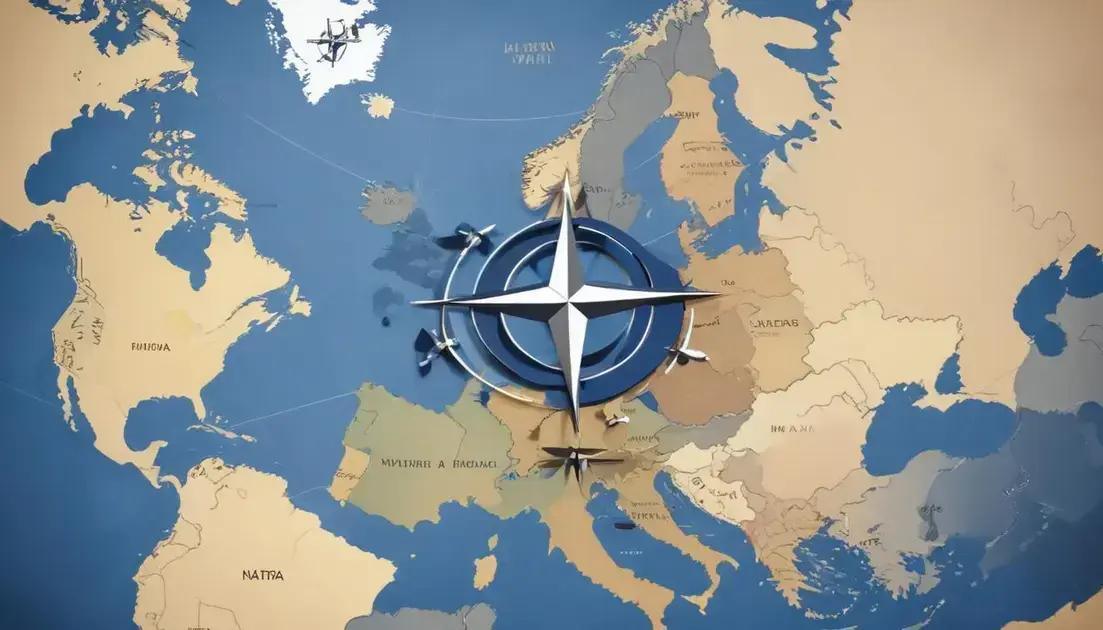
Biotechnology: The New Frontier of Global Security
Biotechnology is revolutionizing national defense by providing advanced medical treatments, enhancing soldier performance, and offering solutions for environmental challenges. The integration of biotechnological innovations leads to improved health outcomes for military personnel and better strategic decisions through data-driven insights. As biotechnology continues to evolve, its impact on defense capabilities will grow, ensuring nations can effectively address modern threats while prioritizing safety and ethical considerations.
Biotechnology is paving new paths in global security, transforming how we think about medicine and science. Curious about its impact? Let’s dive into this revolutionary field!
The evolution of biotechnology in military research
The evolution of biotechnology in military research has been quite fascinating. Over the years, it has played a crucial role in enhancing national defense. Early uses of biotechnology included basic improvements in medicine, but it has come a long way since then.
Key Developments in Military Biotechnology
One of the biggest changes is how scientists now use genetic engineering. This technology allows for the modification of organisms to create new medicines and vaccines. For example, scientists can develop vaccines faster during outbreaks, helping to save lives.
Applications on the Battlefield
In the field, biotechnology helps improve soldier health and performance. Wearable biotech can monitor vital signs and detect illnesses early. This info is crucial for providing timely medical care.
Biotechnology and Food Security
Another important area is food security. Biotechnology helps create crops that are more resistant to pests and diseases. This ensures that military personnel have the food they need, even in harsh environments.
Ethical Considerations
While advancements in biotechnology are exciting, they also bring up questions. How do we balance progress with safety? Ethical guidelines are necessary to ensure that biotechnology is used responsibly. Discussions about the implications of this technology are essential as we move forward.
Overall, biotechnology continues to evolve, offering new options for military research. Its impacts can lead to innovative solutions and better protection for the country.
Implications for global security
The implications of biotechnology for global security are significant and complex. As technology improves, nations must think about both benefits and risks. Biotech can enhance health and safety, but it can also pose threats.
Health Security
One major benefit is health security. Advanced vaccines and treatments help control disease outbreaks. This is vital for protecting populations during crises. Quick responses can prevent the spread of deadly diseases globally.
Bioweapons Concerns
However, there’s a darker side. Bioweapons are a possible threat. Biotechnology can be misused to create harmful pathogens. These could be used in warfare, leading to severe consequences. Nations must remain vigilant against such dangers.
International Regulations
To manage these risks, strong international regulations are essential. Treaties can help govern the use of biotechnology and protect against bioweapons. Research must be conducted responsibly to ensure safety.
Collaborative Efforts
Global cooperation is necessary to address biotechnology challenges. Countries should work together to share knowledge and strategies. This cooperation can lead to better safeguards and responses to potential threats.
Overall, understanding the implications of biotechnology is crucial for global security. By balancing innovation with safety, nations can harness its benefits while minimizing risks.
Case studies of successful biotechnological advancements
Case studies of successful biotechnological advancements show how this field can change lives. Many examples highlight the positive impact of biotech in various sectors.
Vaccines and Disease Control
One notable case is the rapid development of vaccines. For example, during the COVID-19 pandemic, biotechnology allowed for quick creation of effective vaccines. This innovation helped control the spread of the virus and saved countless lives.
Genetically Modified Organisms (GMOs)
Another success story involves GMOs in agriculture. Crops can now be engineered to resist pests and drought. This technology leads to higher yields and food security. Farmers can grow more food with fewer resources.
Tissue Engineering
Tissue engineering is another exciting area. Scientists use biotechnology to create artificial organs. This can help patients waiting for transplants. It may reduce the shortage of donor organs in the future.
Biopharmaceuticals
Biopharmaceuticals are drugs produced using living organisms. These medicines are often more effective than traditional ones. They target specific diseases better and result in fewer side effects.
These case studies illustrate the potential of biotechnology to solve real-world problems. Its ability to innovate continues to reshape health, agriculture, and medicine.
Ethical considerations in military biotech
Ethical considerations in military biotechnology are vital to ensure responsible use. With great power comes great responsibility, especially when it involves human health and safety.
Potential for Misuse
One major concern is the potential for misuse. Biotechnology can be weaponized, creating biological weapons. This raises serious ethical questions about the safety of populations.
Informed Consent
In military research, informed consent is also crucial. Soldiers and volunteers involved in studies should be fully aware of risks. They must understand what they’re signing up for, ensuring their rights are protected.
Transparency in Research
Transparency is key when developing military biotech. Military organizations should share their research goals and findings. Open discussions can help build trust with the public and ensure ethical standards are met.
Regulatory Framework
Having a strong regulatory framework can guide ethical practices. International agreements can help prevent unethical use of biotechnology in military settings. These regulations can promote safe research while allowing innovation.
Overall, considering the ethical implications of military biotechnology is essential. It helps balance innovation with the need for safety and respect for human rights.
The future of biotechnology in national defense
The future of biotechnology in national defense looks promising and full of potential. As technology advances, military applications will likely expand, providing innovative solutions.
Advanced Medical Treatments
One key area is advanced medical treatments for soldiers. Biotechnology can create better drugs and therapies. This includes faster recovery options for injuries sustained on the battlefield.
Precision Combat
Biotechnology can also lead to precision combat systems. For instance, using tailored biologics can enhance soldier performance. This means customized solutions that meet individual needs.
Environmental Adaptations
Another exciting development is environmental adaptations. Biotech solutions could help soldiers adapt to challenging environments. For example, engineered crops could provide food in extreme conditions.
Data-Driven Decisions
Finally, biotechnology can assist in data-driven decisions. Integrating biotech with big data analytics can improve strategy and responses. This helps military leaders make informed choices during operations.
As we look ahead, the role of biotechnology in national defense will keep growing. Its ability to innovate means new approaches to protecting our nations.
Conclusion
In conclusion, the advancements in biotechnology offer exciting opportunities for national defense. From improved medical treatments for soldiers to enhanced combat strategies, biotech is reshaping how we think about military operations. It not only provides innovative solutions but also enhances safety and efficiency.
As we look to the future, it’s clear that biotechnology will play a critical role in addressing the challenges of modern warfare. By investing in these technologies, nations can ensure they are prepared for whatever lies ahead. Embracing the potential of biotechnology is essential for any defense strategy aiming to protect and serve effectively.


